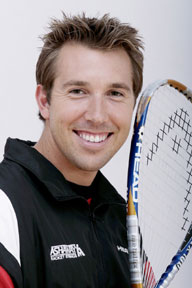|
|

Sponsorships are a Winning Proposition Worth Working For
By Steve Crandall
Vice President, Sales & Marketing
Ashaway Racket Strings
 |
Young and upcoming players are always interested in sponsorships. And as this is a subject that is often talked of, but seldom written about, I thought it would be of interest to offer a few observations here. However, rather than just toot Ashaway's horn as having been an active sponsor for many years, I thought it would be better to get the opinion of someone who has perhaps even wider experience than we do; our own Jack Huczek. We caught him just after his return from the World Championships in Ireland where he finished a very close second to fellow teammate and new men's single World Champion Rocky Carson. Jack has been an Ashaway sponsored player since he was 14 years old, and in the years since has had experience with a number of other sponsorship arrangements as well.
First says Jack, young players need to understand that sponsorships are not endorsements. They hear about big endorsement dollars paid to top professional athletes and they tend to think of these arrangements as one-way streets. They're not. The reality is that sponsorships are intended to drive sales for the sponsoring company. "So whether you're a 14-year-old playing at a local level," says Jack, "or regional level or even a national level, or a professional player, the goal of a sponsorship arrangement is to promote the brand you're representing and to get people to buy that product."
That may sound overly mercenary to idealistic young ears, but it is the engine that drives the process, and supports all the other benefits - and there are many - that sponsorships have to offer. But at base, says Jack, it's a business arrangement in which you must willingly use your influence as a player on behalf of the sponsoring company.
This does not make you a salesperson, but rather, something of an ambassador. Says Jack, "If you're the top player at your club, or the top junior, you are a player at that facility that is very visible, that other racquetball players know. As such you have a degree of influence over the other racquetball players at your club. You agree to use that influence as part of a sponsorship agreement."
Nor are the terms as lucrative as young imaginations might conjure: in fact, for most young amateur sponsorships, you must pay before you receive. "The basic level of sponsorship is a paid contract," said Jack. "In a paid contract, you pay the manufacturer a certain amount of money each year, which gets you a certain amount of equipment. The manufacturer is recognizing you have local influence at your club, and in exchange for your using that influence, they say, 'We'd like to sponsor you, so that instead of paying full retail price, we're going to give you a package deal where you're paying $XXX and getting a bunch of equipment."
As you rise in the sport, sponsorship terms get better. "The level of sponsorship that you get is directly related to your level of influence," said Jack. So someone like myself who competes all over the world and is recognized all over the world, can get better terms than Joe Schmo who plays on the A league at the local YMCA in Palm Springs. So it is directly related to your level of influence, to the number of people and eyeballs that see you with the sponsored product."
But that's not to say sponsorship is all about the manufacturer. There's a lot in it for the players, too, and for the sport. "It works both ways, because the manufacturer will recognize their team players in publications, newsletters, and advertisements - sometimes even in Racquetball Magazine! - and help promote them in different tournament brochures at bigger tournaments."
"Also, larger manufacturers usually take a team approach with sponsored players. For example, at Head, all sponsored players, even myself, fall under the Team Head program. Our players are recognized at national sales meetings, in front of our sales reps, and also at major events where we discuss upcoming products and programs. We also help Head staff to test new products. So in addition to added recognition, team tee-shirts, and camaraderie, we actually have a direct say in the future decision making of the company."
Being sponsored also helps players maintain discipline. Says Jack, "Just because you're sponsored, that's not the end of the road. With Head, every year we have an evaluation process with certain requirements for different level sponsorships. For example, players have to play in a certain number of local, or national tournaments depending on their contract, and if they don't, they are removed from the program."
So how aggressive should young players be in seeking sponsorships? "Very," says Jack, "but not directly. Growing up I had a coach who said, 'if you take care of winning, everything else will take care of itself.' So the moral there is you just focus on playing and beating everyone, and everything else will come, including sponsorships."
This article previously appeared in Racquetball Magazine.
|